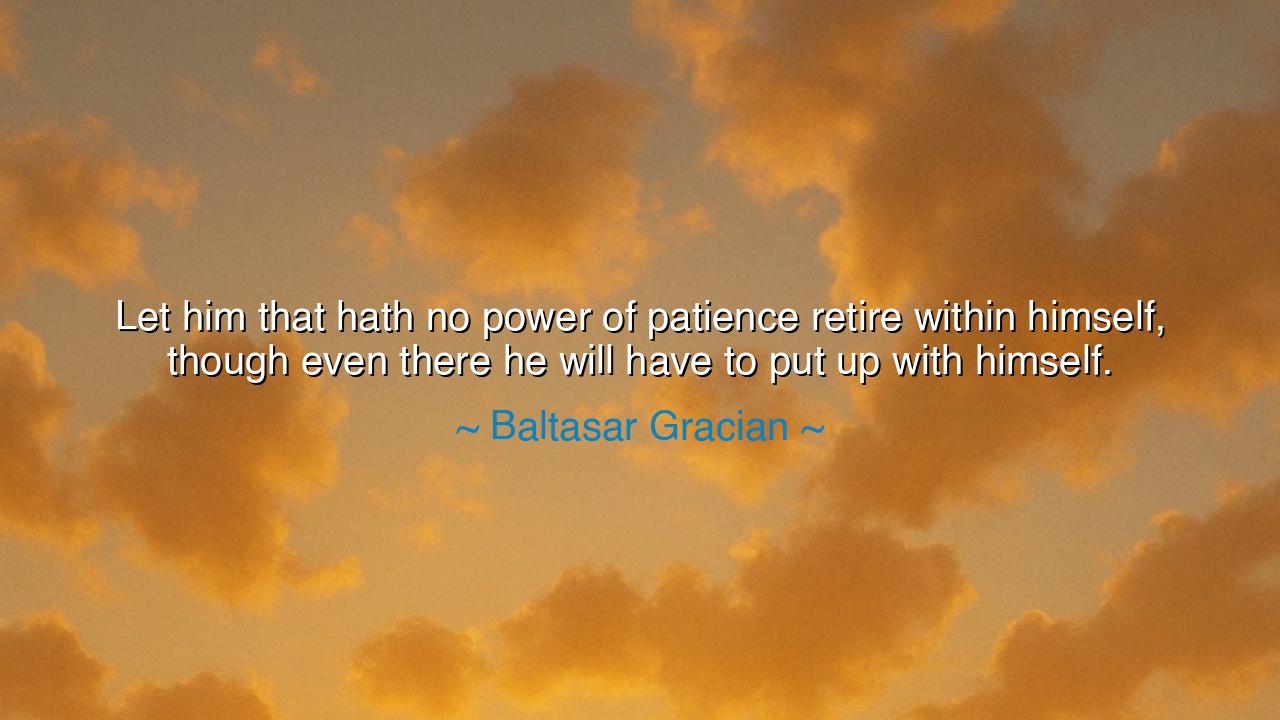
Let him that hath no power of patience retire within himself
Let him that hath no power of patience retire within himself, though even there he will have to put up with himself.






Hear the words of Baltasar Gracián, the wise Jesuit and master of maxims: “Let him that hath no power of patience retire within himself, though even there he will have to put up with himself.” In these words, sharp as a sword and yet filled with sorrow, lies a truth about the nature of the human spirit. He who lacks patience cannot endure others, nor the world, nor the trials that life lays before him. And even if he flees from men, hiding in solitude, he will still be tormented by his own restless heart. For impatience is not a burden of others—it is a prison of the self.
To lack patience is to live in constant conflict. The impatient man quarrels with his neighbor, despises the slowness of time, curses the delays of fate. He believes that the fault lies always in others, yet wherever he goes, he drags his disquiet with him, as a prisoner carries his chains. Gracián reminds us that retreat will not save such a man, for even in the silence of solitude, he must “put up with himself,” and if his soul is stormy, there is no escape.
History speaks with clarity. Recall Diogenes the Cynic, who withdrew from society to live in a barrel. Many thought he had escaped the burdens of men, but in truth, his sharp tongue and restless disdain followed him into isolation. His impatience with society became impatience with all things. His solitude was no peace, but a new theater for his scorn. So it is with every impatient heart: fleeing others does not free us, for the self, undisciplined, becomes the loudest tormentor of all.
Yet the opposite is also true. Consider Marcus Aurelius, emperor of Rome, who bore immense burdens of war, politics, and betrayal. Though surrounded by turmoil, he practiced patience, enduring men’s faults as he endured the weather and the seasons. His solitude was not torment, but strength, for he had learned to be at peace within himself. Thus his meditations still speak across centuries, proving that patience brings harmony, both with the world and with the self.
Gracián’s wisdom is therefore both a warning and a summons. If you cannot endure others, look within—but beware, for you may find your own company unbearable. The call, then, is not to retreat, but to cultivate the power of patience. Only through patience can a man find rest, whether among crowds or in solitude. It is patience that transforms solitude into peace, and society into fellowship. Without it, every place is a battlefield. With it, every place can be a sanctuary.
The lesson, O seekers, is this: do not blame the world for your unrest, nor imagine that escape will cure what dwells in your soul. If you are restless with others, learn patience with yourself. If you are weary of delay, train your spirit to endure the rhythm of time. For no matter where you flee, you carry yourself with you, and unless you are at peace within, there is no peace without.
Practical wisdom lies here: Practice patience in small things, for they prepare you for the great. When delayed, breathe and wait. When offended, pause and forgive. When weary of yourself, remember that even your own faults must be endured with gentleness. Cultivate patience as a shield, for it will guard you not only against others but against the storm within your own heart.
So let Gracián’s words resound like a warning bell: “He that hath no power of patience must put up with himself.” Do not flee the world in bitterness, for you will find no refuge even in solitude. Instead, master the art of patience, and you will discover that peace lies not in escape, but in endurance. For the man who can bear himself can bear the world, and the man who cannot bear himself will find the world unbearable.






AAdministratorAdministrator
Welcome, honored guests. Please leave a comment, we will respond soon